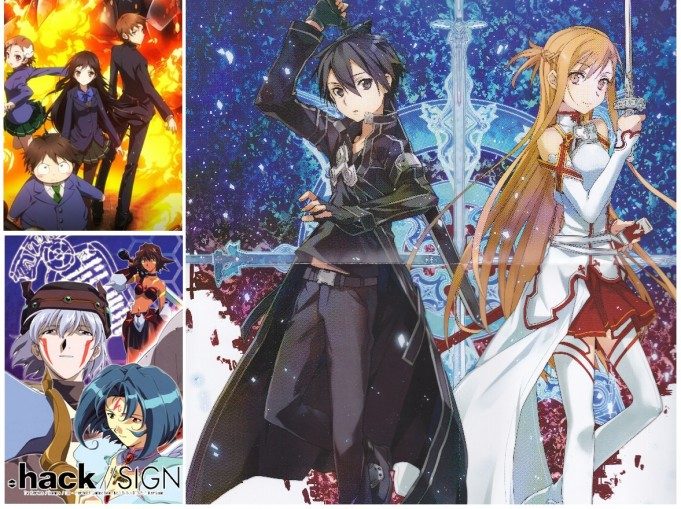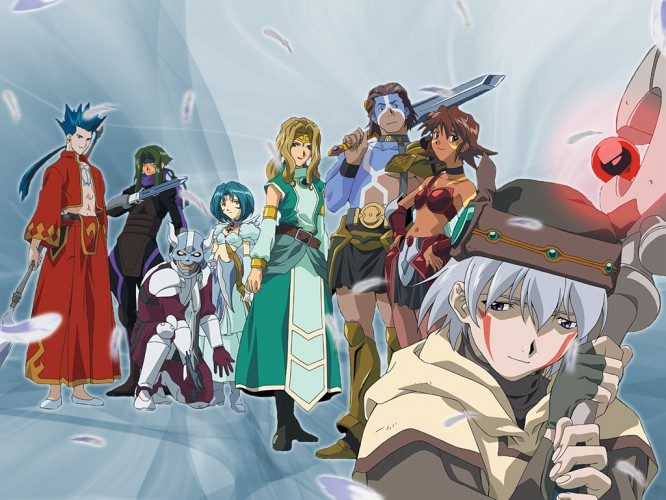Fiction plays a unique role in the formation of technology, often times giving far flung ideas a safe space to grow without being held too close to the light of ration or practicality. There’s no better example of this (to us) than VR, which has found a hospitable niche in Japanese manga and anime far before the first developer kit ever shipped from Oculus. Here we take a look at 3 anime series that we think will become fundamental viewing experiences when looking back on the time when you couldn’t just pop into another world.
1) Sword Art Online (2012)
You can’t mention VR and anime in the same sentence nowadays without immediately referring to Sword Art Online (SAO), a series set in the not too distant future of 2022, which centers around a virtual reality MMORPG of the same name. The series follows the adventures of Kirito, a 14 year boy who, through the use of a fully integrated VR device called ‘NerveGear’, is transported from his quiet home to the online fantasy world where in typical anime fashion he possesses a surprisingly formidable and unorthodox fighting skill. Without spoiling much of the plot, let’s just say the stakes are raised when people start having trouble logging out of the game.
See Also: Oculus VR Showing Sword Art Online Demo for the Oculus Rift at Anime Expo
Fans of the series have gone to incredible lengths to recreate the look and feel of SAO, spawning a VR demo of the inworld GUI, and even its own Minecraft Mod. Oculus founder Palmer Luckey fields the question of SAO so often that he even tweeted this:
PSA: Yes, I have seen Sword Art Online.
— Palmer Luckey (@PalmerLuckey) September 22, 2014
Where to Watch: In the US, you can watch all of Sword Art Online on Hulu (free) or Netflix, and the second season, Sword Art Online II (Gun Gale Online) on Hulu (free).
2) .hack//Sign (2002)
Back in the good old days of PlayStation 2, we had the .hack (dot hack) series to keep us imaging of fully immersive virtual worlds. In fact, the anime series in question, .hack//Sign, was released in tandem with .hack//Infection (2002), a PS2 game sharing the anime’s MMORPG backdrop, a place simply called ‘The World’. The anime follows an amnesia-stricken teenage boy, Tsukasa, in a very familiar ‘coming of age while stuck in VR’ story line that’s more of a spiritual progenitor to SAO.
If you’re easily bored by what have since become played out VR tropes, .hack//Sign may not be for you. But considering the .hack series picked up virtual reality as a plot device when nearly no one was paying attention to virtual reality, and helped rekindle it in the imagination of countless members of today’s VR community (yours truly included), it certainly merits at least a curious glance.
Where to Watch: In the US you can watch all of .hack//Sign for free on Hulu.
3) Accel World (2012)
In all its Japanese weirdness (which is a good thing), Accel World changes things up in the VR anime genre by putting its characters in a hyper accelerated state, where they are forced to enter into the online battle arena called ‘Accel World’. Hours inside Accel World are really only a split second in real life, which mostly eliminates the question of where to put those vulnerable bodies during extended battles. Mostly.
We discover the world of 2046 through the eyes of Haru, who is—you guessed it—a mildmannered teenage school boy who, through a hacked program on his ‘Neuro-Link’, a VR device embedded in his body, becomes what the series calls a ‘Brain Burster’. Every level he gains in the virtual world means increased power and mental prowess in the real world. Lose your levels in an unfortunate duel though, and you’re banished from Accel World forever. Don’t let the cutesy mix in styles scare you away though, because Accel World gets a little dark too.
Accel World‘s treatment of VR games, and how natural and pervasive they have become in its everyday interactions, may be its most astute observation.
Where to Watch: In the US you can watch all of Accel World for free on Hulu.
Honorable Mentions
If you’re looking for more VR-related anime, Btooom!, Ixion Saga DT, Log Horizon, Dennou Coil (more AR than VR), and Ghost in the Shell series (some elements of VR, but not entirely VR-based), are all excellent starting points, and offer their own spin on how the world integrates (or doesn’t) with the new technology. Let us know your favorite!








